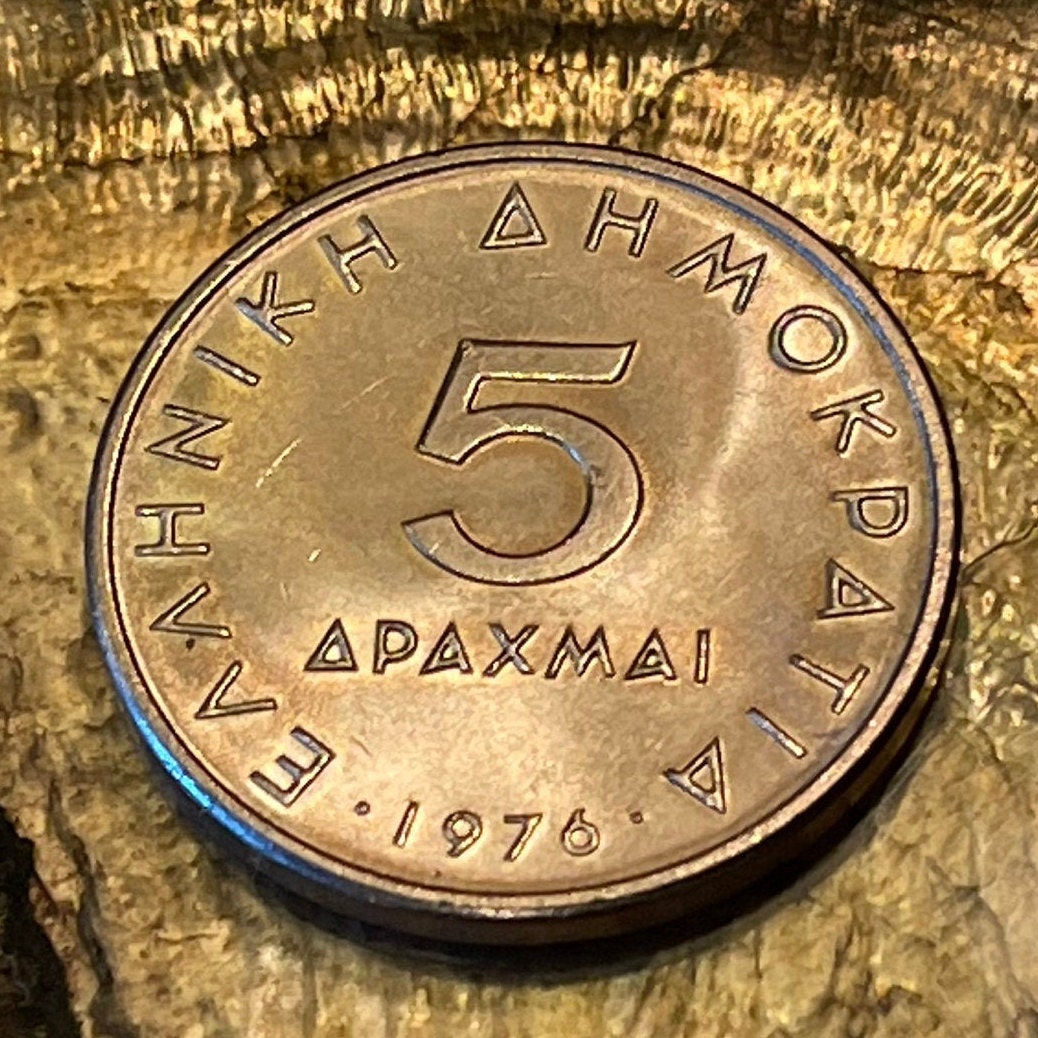elemintalshop
Aristotle 5 Drachmai Greece Authentic Coin Money for Jewelry and Craft Making
Aristotle 5 Drachmai Greece Authentic Coin Money for Jewelry and Craft Making
Couldn't load pickup availability
Aristotle 5 Drachmai Greece Authentic Coin Charm for Jewelry and Craft Making
Obverse: The portrait in left profile of Aristotle (384 - 322 BC), a Greek philosopher and scientist, a student of Plato and teacher of Alexander the Great. According to the Encyclopedia Britannica: "Aristotle was the first genuine scientist in history ... and every subsequent scientist owes him something"
Lettering: ΑΡΙΣΤΟΤΕΛΗΣ
Translation: Aristotle
Reverse: Denomination, date below
Lettering: ΕΛΛΗΝΙΚΗ ΔΗΜΟΚΡΑΤΙΑ
5 ΔΡΑΧΜΑΙ
Translation: Hellenic Republic
5 Drachmai
Features
Issuer Greece
Period Third Hellenic Republic (1974-date)
Type Standard circulation coin
Years 1976-1980
Value 5 Drachmai (5 GRD)
Currency Third modern drachma (1954-2001)
Composition Copper-nickel
Weight 5.5 g
Diameter 22.5 mm
Thickness 1.85 mm
Shape Round
Orientation Medal alignment ↑↑
Demonetized 02-28-2002
Number N# 554
References KM# 118, Schön# 61
Wikipedia:
Aristotle (/ærɪˈstɒtəl/;[3] Greek: Ἀριστοτέλης Aristotélēs; 384–322 BC) was a Greek philosopher and polymath during the Classical period in Ancient Greece. Taught by Plato, he was the founder of the Lyceum, the Peripatetic school of philosophy, and the Aristotelian tradition. His writings cover many subjects including physics, biology, zoology, metaphysics, logic, ethics, aesthetics, poetry, theatre, music, rhetoric, psychology, linguistics, economics, politics, meteorology and government. Aristotle provided a complex synthesis of the various philosophies existing prior to him. It was above all from his teachings that the West inherited its intellectual lexicon, as well as problems and methods of inquiry. As a result, his philosophy has exerted a unique influence on almost every form of knowledge in the West and it continues to be a subject of contemporary philosophical discussion.
Little is known about his life. Aristotle was born in the city of Stagira in Northern Greece. His father, Nicomachus, died when Aristotle was a child, and he was brought up by a guardian. At seventeen or eighteen years of age he joined Plato's Academy in Athens and remained there until the age of thirty-seven (c. 347 BC). Shortly after Plato died, Aristotle left Athens and, at the request of Philip II of Macedon, tutored Alexander the Great beginning in 343 BC. He established a library in the Lyceum which helped him to produce many of his hundreds of books on papyrus scrolls. Though Aristotle wrote many elegant treatises and dialogues for publication, only around a third of his original output has survived, none of it intended for publication.
Aristotle's views on physical science profoundly shaped medieval scholarship. Their influence extended from Late Antiquity and the Early Middle Ages into the Renaissance, and were not replaced systematically until the Enlightenment and theories such as classical mechanics were developed. Some of Aristotle's zoological observations found in his biology, such as on the hectocotyl (reproductive) arm of the octopus, were disbelieved until the 19th century. His works contain the earliest known formal study of logic, studied by medieval scholars such as Peter Abelard and John Buridan. Aristotle's influence on logic also continued well into the 19th century.
He influenced Judeo-Islamic philosophies (800–1400) during the Middle Ages, as well as Christian theology, especially the Neoplatonism of the Early Church and the scholastic tradition of the Catholic Church. Aristotle was revered among medieval Muslim scholars as "The First Teacher" and among medieval Christians like Thomas Aquinas as simply "The Philosopher". His ethics, though always influential, gained renewed interest with the modern advent of virtue ethics.
Share










I got what I ordered.
Beautiful product, well packaged, quickly shipped and the perfect addition to our Greece study in my third grade classroom. Thank you!
Great for deciding people's fates.
-Anton Chigurh
Nice and shiny coin. Thank you very much,
As described, arrived safely and promptly.









